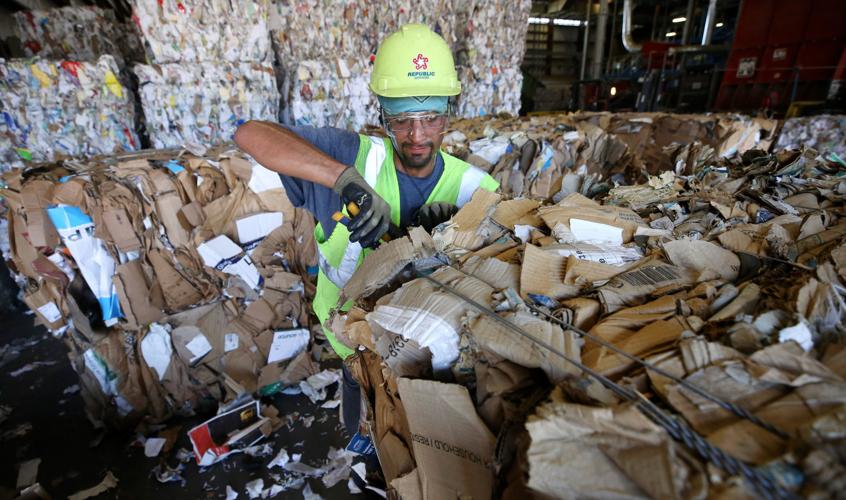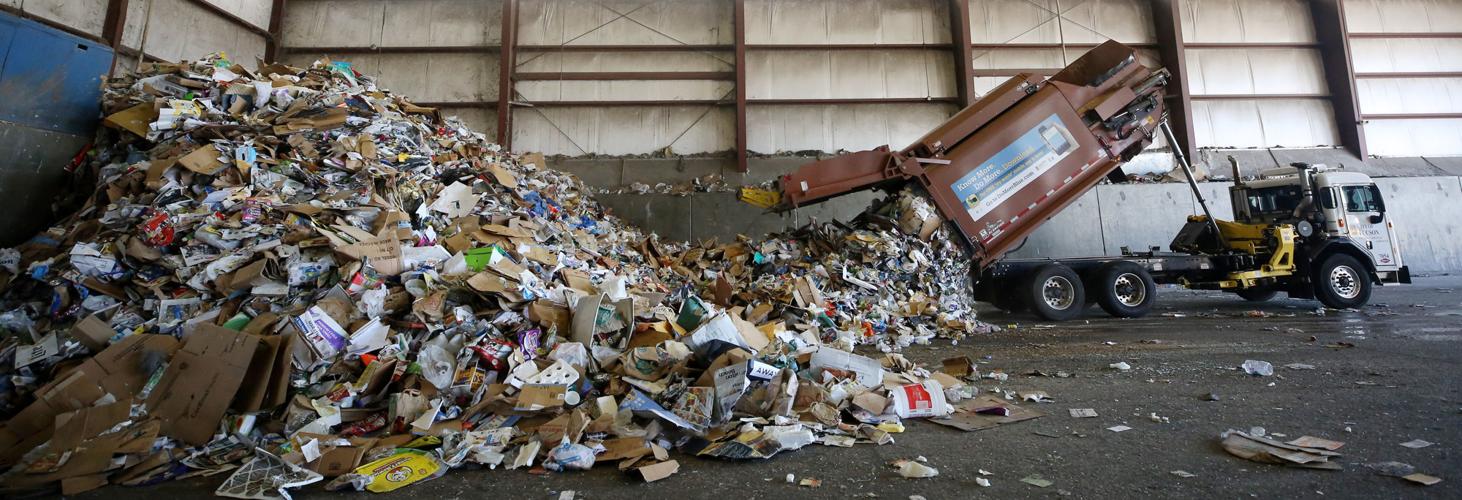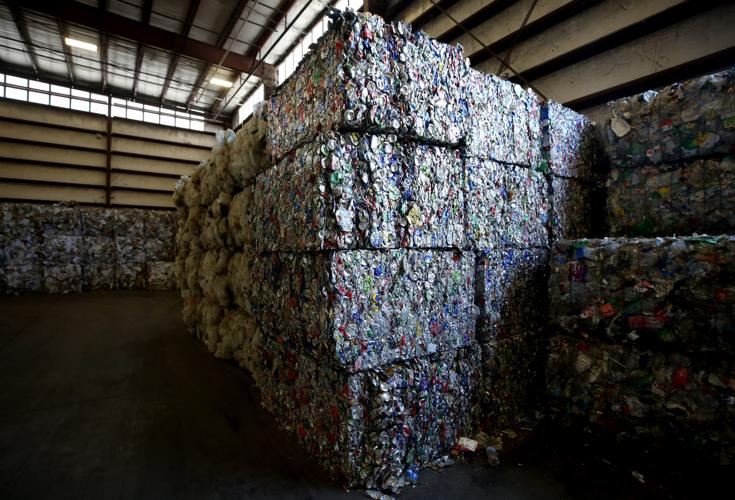Tucsonans may soon pay more money for fewer recycling pickups as the global market for plastics and paper implodes due to new restrictions on imports in China and other Asian countries.
With recycling revenues falling, costs rising and household contamination of recycled products on the upswing, Tucson officials say they plan to soon provide the City Council with several options.
Residents could face new measures by the end of the year, city officials say.
Possible measures include:
- Fewer pickups. A reduction in curbside pickups of recyclable plastic tubs, bottles, paper and glass from four times a month to twice monthly.
- Higher rates. “Ultimately” recycling pickup fees for families could rise from a current range of 15 to 45 cents per household monthly to up to 75 cents per month, said Carlos De La Torre, the city’s environmental services director.
- Escalating enforcement. For people leaving too many contaminants in their recycling bins, the ultimate hammer could be to pull recycling bins from such households, in favor of a second garbage bin, De La Torre said.
- More public education, to get people to put fewer contaminants in the blue recycling bins.
These ideas come as recycling programs nationally face a growing squeeze due to recent Chinese bans and restrictions on imports of paper and plastic. That country has long been the world’s largest importer of recycled products.
This year, China has stopped accepting 24 varieties of plastic and paper products. It also now requires that acceptable products contain no more than 0.5 percent contamination, including by nonrecyclable items and by food products — for example, sauce and cheese that stain pizza boxes. Previously, China accepted materials that were up to 3 percent to 5 percent contaminated.
Also, in May and June, Vietnam and Thailand, finding themselves newly buried in plastics that had previously gone to China, slapped bans on imports of many forms of plastic.
A year ago, Republic Services, which runs the city of Tucson-owned recycling center, sold 30 percent of its recyclables to China. Now, it’s closer to 1 percent, said Jake Anderson, the center’s general manager.
“It’s much more difficult to process to the 99.5 percent specification at which China wants to purchase it,” he said. That’s far cleaner than most U.S. recycling facilities are designed to process materials to.
“Because the product can no longer move, we’re flooding the market,” De La Torre said. “There’s a significant amount of supply and the demand is not there.
“China has realized they have a major pollution problem. They’re trying to solve it from different angles. If they’re receiving contaminated recyclables, it’s up to them to dispose of them on their land. They have to melt it and process it and maybe contaminate their land,” De La Torre said.
Contamination
called “rampant”
The global recycling bottleneck’s root cause is that people here and nationally are putting increasing amounts of non-recyclable materials into their bins, say Tucson officials and some recycling experts.
Contamination is “rampant” here and nationally, said Anderson of Republic Services, a national, Scottsdale-based company that also manages a center in Phoenix.
The upshot locally is that Tucson’s recycling program finished fiscal year 2017-18 slightly in the red. The Environmental Services Department projects the program will run an estimated $500,000 deficit in fiscal 2018-19. That’s a big comedown from the net $1 million to $2 million that the program reaped annually during the first three years of this decade.
Efforts to clean up recyclables at the city-owned, privately operated recycling center have increased costs. At the same time, the Chinese restrictions created a glut of recyclables that has slashed prices U.S. cities can sell them for.
Contamination today accounts for about 22 percent of the materials that Tucson residents leave in their blue recycling bins each week. That’s up from 16 percent seven years ago, city officials say.
The trash giant Waste Management Inc., which collects recyclables in much of suburban Tucson, pegs its contamination level at about 20 percent. Waste Management serves Marana, Catalina, Oro Valley, Sahuarita, Vail and Green Valley and also delivers recyclables to Republic’s recycling center.
Phoenix estimates a 30 percent contamination rate.
In a statement, Waste Management told the Star that it’s “working to educate Tucson-area customers on proper recycling so that we can minimize impact on rates.”
Contaminants commonly found in bins include diapers, appliances, food wastes, dead tree limbs, tires, toilet seats, garden hoses, furniture, concrete and other construction materials, foam containers, plastic bags, clothing, rubber hoses and extension cords, said De La Torre and Anderson.
In an interview Tuesday, the city’s De La Torre said department officials haven’t figured out yet exactly what measures to propose, adding, “I don’t want to corner the council on specific things that need to be done.”
He said he wants to give council members “cafeteria level options.” He has prepared a memo outlining potential courses of action that’s now at the City Manager’s Office.
De La Torre would not release the memo to the Star, saying it remains in draft form and under final review with Manager Michael Ortega. He hopes to get it to the City Council in the next few days, De La Torre said Thursday.
Councilman Steve Kozachik asked De La Torre several weeks ago whether any city recyclables are going to landfills due to the China restrictions.
“At this time, we have no reasons to believe that our recyclable materials are going to the landfill, but one thing for sure is that we will need to pay more to get our recyclables processed,” De La Torre wrote to Kozachik.
The city doesn’t want to stop taking some recyclables, because “the market can turn around later. It will be hard for us to tell the public, ‘Now we are accepting items, then no we are not accepting them, and then we are,’” De La Torre told the Star.
Other cities landfilling some items
If the city can divert materials from going into the landfill, that is a plus, he said. Tucson wants to extend the life of its Los Reales Landfill, which is expected to last 70 years.
Sierra Vista and Flagstaff residents aren’t so lucky.
On July 1, Sierra Vista stopped taking paper or paperboard materials as recyclables. It cut its weekly recycling pickups to twice monthly, and increased trash collection fees by 15 percent.
On June 1, Flagstaff went a lot further, halting recycling of plastics except for jugs, bottles and jars. Plastic trays, takeout containers, cups and produce containers can no longer be recycled at the city’s recycling facility, the Arizona Daily Sun reported.
It’s even harder today to find buyers for materials that were already hard to recycle, especially the lower-quality plastics, Flagstaff Solid Waste Director Todd Hanson told the Sun.
The story is the same at Norton Environmental, the company that operates the recovery facility where Flagstaff sends its recyclables, its general manager Ray Sellards told the Sun.
Sellards is sitting on eight trailer loads of those low-quality plastics, with nowhere to unload them, he said in June.
In Phoenix, city recycling officials are now sending to a local landfill a tiny fraction of plastics, less than 1 percent. No. 3 plastics — such as shampoo containers — and No. 4 squeezable bottles for hand lotions are now landfill-bound. The same goes for No. 7s, which include sunglasses, DVDs, iPod cases and other products.
Phoenix is now seeking bids from private contractors willing to accept and try to recycle those products, said Brenda Yanez, a Phoenix Public Works Department spokeswoman.
Phoenix’s recycling revenues are also down drastically — two-thirds what they were last year as of June.
Stockpiles and higher sorting costs
There’s no talk in Tucson of taking any recyclables to the landfill.
But the city’s De La Torre said he saw 300 to 400 bales of recyclable material stockpiled outside the Republic Services processing center here a few weeks ago, apparently awaiting pickup by contractors who would ship them out for recycling.
Such stockpiling has been reported at similar centers elsewhere in the country because the centers were having to hunt far and wide for markets for the recyclable products.
When De La Torre drove by that center last Tuesday, the stockpile had dwindled to 30 to 50 bales. Typically, “you don’t see that kind of materials basically out in the yard,” he said.
Doug Jennings, the recycling plant manager, countered that stockpiling isn’t the word he would use, because the bales stored outside were “simply waiting for trucks to show up. We had trucks coming in there intermittently for a few weeks in search of equipment and markets.”
City officials and center operators agree on why the contamination headaches are driving up costs and slashing revenues.
To remove contaminants, Republic has to improve the technology of the equipment it uses to sort materials, which costs money. It also has to hire more people to sort materials.
Waste Management, which runs its own recycling processing plant in Surprise near Phoenix, said it has slowed operations there to hand-pick more contaminants from its sorting lines. Its workers spend extra time “quality-checking finished bales to remove any contaminants.”
While it’s been hard for authorities to pinpoint why the recyclables are so contaminated, one oft-cited factor is what many experts call “aspirational” recycling. That’s when people dump plastics into their bins that they believe should be recycled, regardless of whether a city program accepts them.
“It’s just either convenience, laziness or just trying to get rid of material at any expense,” De La Torre said. “There’s no other thing we can think of outside of that. Also, we have two barrels (at home, the other is for garbage). If we run out of room in one, and we try to stretch the limits of what is recyclable, we end up putting things in the bin that shouldn’t be there.”
People aren’t trying to contaminate on purpose, added Republic’s Anderson.
“They want to recycle. They want to do the right thing. (But) it’s very difficult to educate the public,” Anderson said.
“Pizza boxes are classic examples. A lot of people eat pizza Friday night, and say that’s great recycling material. But no, it’s greased: garbage, not recyclable.”
Likewise, a plastic container carrying a to-go restaurant meal can be recyclable, but if you don’t rinse out the plastic to remove food “that is a contaminated recyclable,” De La Torre said.
For at least four years, a city information specialist has been going through homeowners’ curbside recycling bins, at least two days a week, to see what’s in them. Officials use findings from that research to get the word out to residents about what they can and can’t recycle, De La Torre said.
So far, they haven’t made much headway. Their next strategy is to map out areas of the city based on their recyclable contaminant levels and target different neighborhoods with different messages.
Asked how it deals with the contamination issue, Waste Management said: “We emphasize a simple message: Only recycle clean and empty bottles, cans, paper and cardboard in your curbside cart.”








